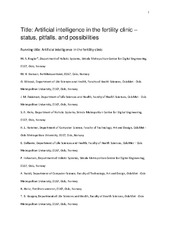Blar i forfatter "Yazidi, Anis"
-
Artificial intelligence in dry eye disease
Storås, Andrea Marheim; Strumke, Inga; Riegler, Michael Alexander; Grauslund, Jakob; Hammer, Hugo Lewi; Yazidi, Anis; Halvorsen, Pål; Gundersen, Kjell Gunnar; Utheim, Tor Paaske; Jackson, Catherine Joan (Journal article; Tidsskriftartikkel, 2021-11-27)Dry eye disease (DED) has a prevalence of between 5 and 50%, depending on the diagnostic criteria used and population under study. However, it remains one of the most underdiagnosed and undertreated conditions in ophthalmology. Many tests used in the diagnosis of DED rely on an experienced observer for image interpretation, which may be considered subjective and result in variation in diagnosis. ... -
Artificial intelligence in the fertility clinic: status, pitfalls and possibilities
Riegler, Michael Alexander; Stensen, Mette Haug; Witczak, Oliwia; Andersen, Jorunn Marie; Hicks, Steven; Hammer, Hugo Lewi; Delbarre, Erwan; Halvorsen, Pål; Yazidi, Anis; Holst, Nicolai; Haugen, Trine B. (Journal article; Tidsskriftartikkel; Peer reviewed, 2021-07-29)In recent years, the amount of data produced in the field of ART has increased exponentially. The diversity of data is large, ranging from videos to tabular data. At the same time, artificial intelligence (AI) is progressively used in medical practice and may become a promising tool to improve success rates with ART. AI models may compensate for the lack of objectivity in several critical procedures ... -
A Deep Diagnostic Framework Using Explainable Artificial Intelligence and Clustering
Thunold, Håvard Horgen; Riegler, Michael; Yazidi, Anis; Hammer, Hugo Lewi (Journal article; Tidsskriftartikkel; Peer reviewed, 2023-11-09)An important part of diagnostics is to gain insight into properties that characterize a disease. Machine learning has been used for this purpose, for instance, to identify biomarkers in genomics. However, when patient data are presented as images, identifying properties that characterize a disease becomes far more challenging. A common strategy involves extracting features from the images and ... -
Efficient quantile tracking using an oracle
Hammer, Hugo Lewi; Yazidi, Anis; Riegler, Michael; Rue, Håvard (Journal article; Tidsskriftartikkel; Peer reviewed, 2022-04-14)Concept drift is a well-known issue that arises when working with data streams. In this paper, we present a procedure that allows a quantile tracking procedure to cope with concept drift. We suggest using expected quantile loss, a popular loss function in quantile regression, to monitor the quantile tracking error, which, in turn, is used to efficiently adapt to concept drift. The suggested ... -
LightLayers: Parameter Efficient Dense and Convolutional Layers for Image Classification
Jha, Debesh; Yazidi, Anis; Riegler, Michael Alexander; Johansen, Dag; Johansen, Håvard D.; Halvorsen, Pål (Chapter; Bokkapittel, 2021-02-21)Deep Neural Networks (DNNs) have become the de-facto standard in computer vision, as well as in many other pattern recognition tasks. A key drawback of DNNs is that the training phase can be very computationally expensive. Organizations or individuals that cannot afford purchasing state-of-the-art hardware or tapping into cloud hosted infrastructures may face a long waiting time before the training ... -
Predicting an unstable tear film through artificial intelligence
Fineide, Fredrik; Chen, Xiangjun; Magnø, Morten Schjerven; Yazidi, Anis; Riegler, Michael; Utheim, Tor Paaske; Storås, Andrea Marheim (Journal article; Tidsskriftartikkel; Peer reviewed, 2022-12-10)Dry eye disease is one of the most common ophthalmological complaints and is defined by a loss of tear film homeostasis. Establishing a diagnosis can be time-consuming, resource demanding and unpleasant for the patient. In this pilot study, we retrospectively included clinical data from 431 patients with dry eye disease examined in the Norwegian Dry Eye Clinic to evaluate how artificial intelligence ... -
Towards the Neuroevolution of Low-level artificial general intelligence
Pontes Filho, Sidney; Olsen, Kristoffer; Yazidi, Anis; Riegler, Michael; Halvorsen, Pål; Nichele, Stefano (Journal article; Tidsskriftartikkel; Peer reviewed, 2022-10-14)In this work, we argue that the search for Artificial General Intelligence should start from a much lower level than human-level intelligence. The circumstances of intelligent behavior in nature resulted from an organism interacting with its surrounding environment, which could change over time and exert pressure on the organism to allow for learning of new behaviors or environment models. Our ...


 English
English norsk
norsk





